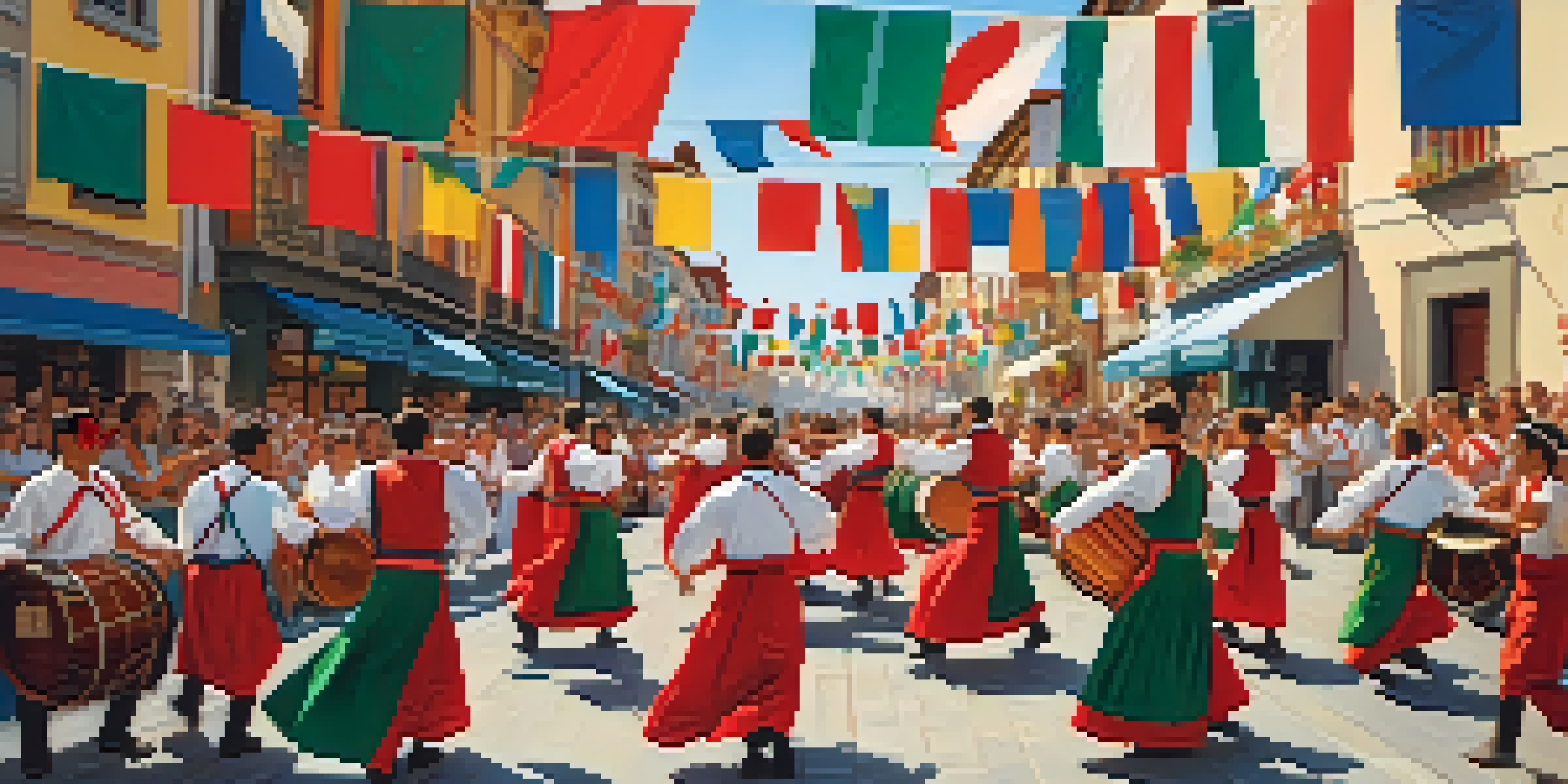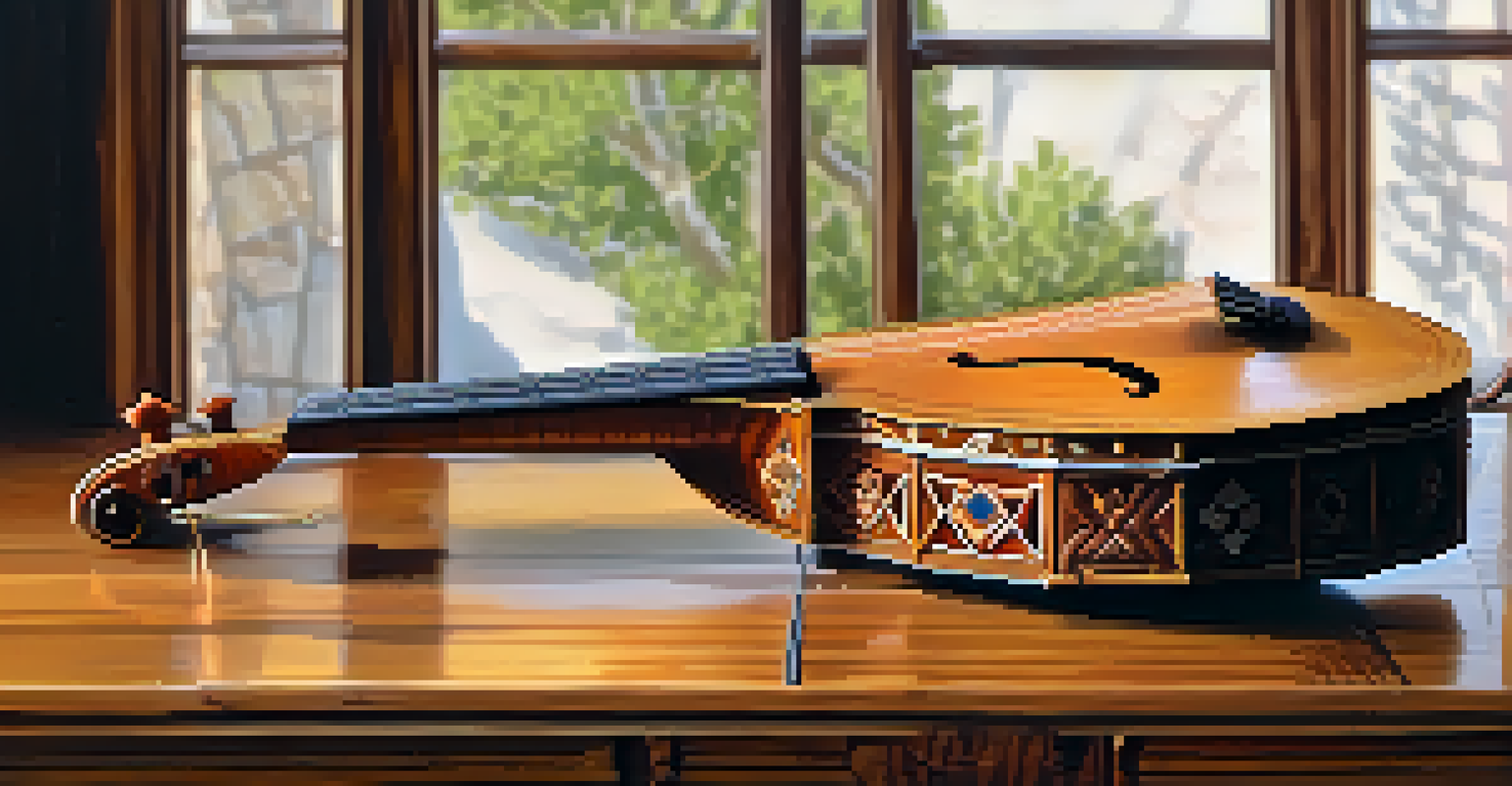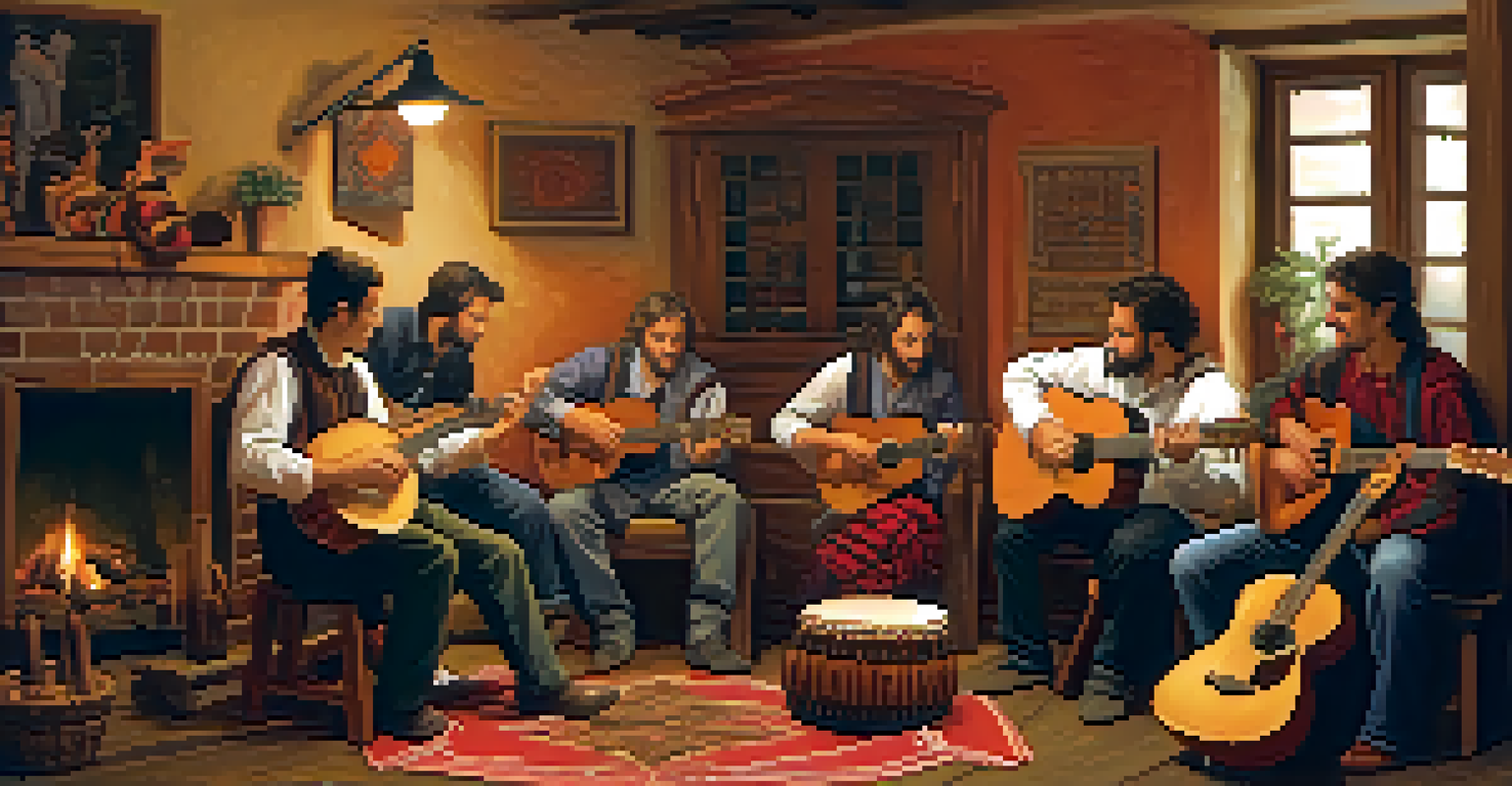The Influence of Basque Music in Spanish Regional Culture

Understanding Basque Music and Its Roots
Basque music is a vibrant tapestry woven from centuries of tradition and regional influence. It reflects the unique cultural identity of the Basque people, who inhabit the areas straddling northern Spain and southwestern France. Instruments like the txistu (a type of flute) and the drum offer a rhythmic foundation that resonates with the community's spirit.
Music is the shorthand of emotion.
The origins of Basque music can be traced back to ancient times, where oral traditions served as a way to pass down stories and folklore. These tunes often celebrate everyday life, love, and the beauty of nature, becoming an integral part of social gatherings and festivals. Over the years, it has evolved while retaining its core elements, making it a living tradition.
As globalization continues to influence music, Basque styles have found their way into wider Spanish culture, creating a dialogue between old and new. This fusion is evident in contemporary interpretations that maintain the essence of traditional melodies while appealing to modern audiences.
Key Instruments That Define Basque Music
The instruments used in Basque music are as diverse as the culture itself, with each playing a unique role in shaping the soundscape. The txistu, a three-hole flute, is often accompanied by the drum, creating lively rhythms that invite dancers to join in. Another notable instrument is the alboka, a traditional horn made from animal skin, which adds a haunting yet beautiful tone.

These instruments not only produce music but also serve as symbols of Basque identity. During festivals and public celebrations, you can often hear these sounds echoing through the streets, reminding everyone of their shared heritage. It's not uncommon for musicians to play together spontaneously, creating an atmosphere of joy and camaraderie.
Basque Music Reflects Cultural Identity
Basque music is a vital expression of the community's history and values, preserving their unique identity in a changing world.
Moreover, the way these instruments are played can vary significantly between regions, adding a layer of richness to Basque music. This regional diversity contributes to the broader Spanish musical landscape, influencing styles and techniques far beyond the Basque Country.
Basque Music in Festivals and Celebrations
Festivals in the Basque Country are a celebration of life, where music takes center stage. Events like the Semana Grande in Bilbao showcase traditional Basque music, drawing locals and tourists alike to revel in the joyful atmosphere. During such occasions, musicians often perform on street corners, inviting passersby to dance and celebrate together.
Without music, life would be a mistake.
These gatherings highlight the communal aspect of Basque music, where the lines between performer and audience blur. Everyone participates, whether by dancing, clapping, or simply enjoying the melodies. This sense of togetherness is a hallmark of Basque culture, emphasizing that music is not just for listening but for living.
As these festivals gain popularity, they also introduce Basque music to a broader audience, fostering appreciation and understanding of its significance. The infectious spirit of these events often leads to collaborations with artists from other regions, further enriching Spanish cultural dialogues.
The Role of Basque Music in Cultural Identity
Basque music plays a crucial role in shaping the cultural identity of the Basque people. It acts as a medium through which history, values, and traditions are communicated, helping to preserve a distinct sense of self amidst a rapidly changing world. The melodies often reflect the struggles and triumphs of the Basque community, making them powerful storytelling tools.
In recent years, there has been a resurgence of interest in traditional Basque music as younger generations seek to reconnect with their roots. This revival has led to a renewed appreciation for folk songs and dances, ensuring that these traditions are not forgotten. Schools and community groups are increasingly incorporating Basque music into their programs, fostering pride among the youth.
Traditional Instruments Shape Sound
Instruments like the txistu and alboka are central to Basque music, symbolizing cultural heritage and inviting communal participation.
As Basque music continues to thrive, it also influences other Spanish regional cultures, encouraging collaboration and exchange. This intermingling enriches the cultural tapestry of Spain, demonstrating how music can bridge divides and foster understanding.
Modern Influences on Basque Music
In today’s digital age, Basque music is undergoing a transformation thanks to modern influences. Artists are blending traditional sounds with contemporary genres like rock, pop, and electronic music, creating innovative new styles. This fusion not only attracts younger audiences but also showcases the versatility of Basque music.
Platforms like social media and streaming services have made it easier for Basque musicians to share their work with the world. This exposure has led to collaborations with artists from various backgrounds, resulting in unique musical hybrids that reflect a globalized culture. It's fascinating to see how traditional melodies can coexist and evolve alongside modern rhythms.
However, this evolution comes with challenges as musicians navigate the balance between preserving authenticity and embracing change. Many artists are passionate about maintaining their cultural roots while also pushing boundaries, ensuring that Basque music remains relevant in a rapidly evolving musical landscape.
The Impact of Basque Music on Spanish Regional Cultures
The influence of Basque music extends beyond its borders, impacting various Spanish regional cultures. As musicians from other regions adopt Basque elements, they create a rich tapestry of sound that reflects the shared history of Spain. This cross-pollination enriches the musical landscape, showcasing the diversity and interconnectedness of Spanish culture.
For instance, you can hear Basque rhythms and melodies in the music of neighboring regions, where artists often draw inspiration from their Basque counterparts. This kind of cultural exchange promotes unity and fosters a greater understanding of the unique contributions each region brings to the table. It’s a beautiful reminder of how music can serve as a bridge between communities.
Modern Influences Revitalize Tradition
The integration of contemporary genres into Basque music attracts younger audiences and showcases its adaptability while honoring its roots.
Moreover, festivals celebrating regional music often include Basque performances, highlighting its significance in the broader Spanish narrative. As audiences embrace these influences, they not only celebrate the uniqueness of their own cultures but also acknowledge the richness that comes from shared musical heritage.
Preserving Basque Music for Future Generations
As the world changes, preserving Basque music becomes increasingly important. Efforts to document traditional songs, dances, and instruments are underway to ensure that future generations can experience this vibrant culture. Local organizations and cultural institutions play a crucial role in these initiatives, creating archives and educational programs dedicated to Basque music.
Community engagement is also vital in this preservation effort. Workshops and performances encourage participation from all age groups, fostering a sense of ownership and continuity within the community. When children learn to play traditional instruments and sing folk songs, they embody the living history of their culture.

Ultimately, the preservation of Basque music is not just about maintaining the past; it's about ensuring that this cultural treasure continues to thrive and evolve. By embracing both tradition and innovation, the Basque people can keep their musical heritage alive, enriching not only their own identity but also the broader Spanish cultural landscape.